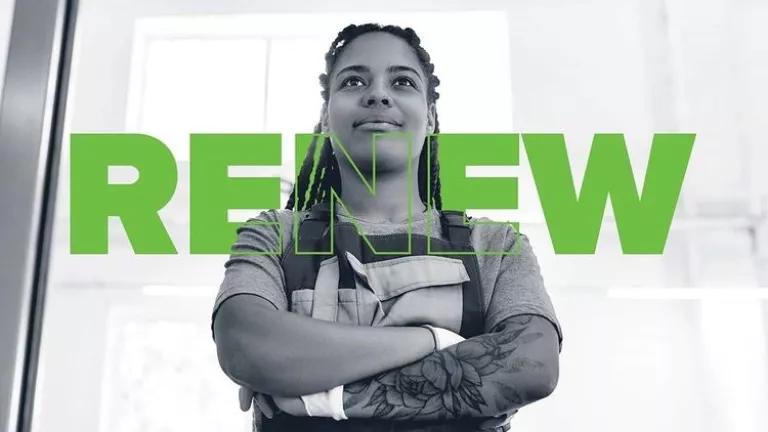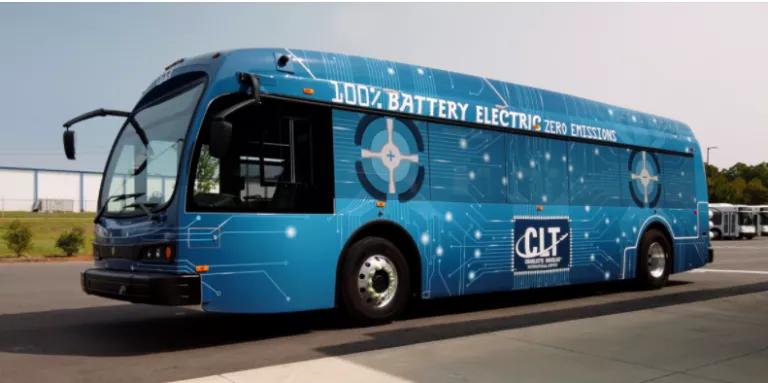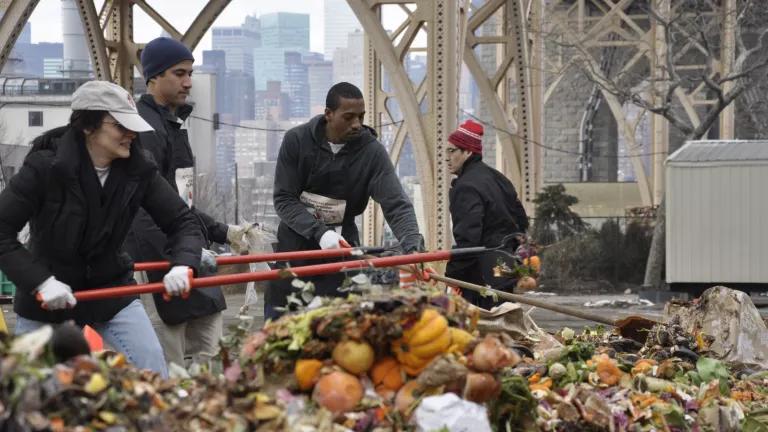Charlotte's Climate Action Cleans Air and Spurs Economy

The City of Charlotte, under the leadership of Mayor Vi Lyles and City Council, and with support from the Bloomberg Philanthropies American Cities Climate Challenge, is making smart shifts in city operations. Whether it’s powering city-owned buildings and vehicles with cleaner energy sources or investing in the community through job training programs, Charlotte is modeling how to reduce emissions in buildings, cars, buses and how to renew the regional economy. Here are a few examples:
Reducing pollution in city-owned buildings
Charlotte City Council kicked off 2021 by passing a plan for greening the city’s municipal operations. This updated Sustainable Facilities Policy is just the latest in a series of smart moves the city has made that together signals a coming year of reinvesting in jobs and public health as a win-win for economic recovery from COVID.
Charlotte envisioned a safer and cleaner future when the City Council unanimously adopted the city’s Strategic Energy Action Plan in 2018 that set the municipal operations on course to source 100% of its energy use in buildings and fleet from zero carbon sources by 2030. The city is flexing its muscle to realize this goal with budget investments that ripple benefits across the community. With each city dollar spent, Charlotte reduces operating costs, supports job growth and leverages city budgets to rebuild local wealth, fuel the local economic recovery and improve public health.
Just one example of this high return on investment is that this policy will set the city on course to begin “building benchmarking” - tracking and reporting energy use by municipal buildings - which will save the city money. Here's how it works: city building managers check buildings’ performance compared to national data so they can strategically select upgrades that will maximize the most savings. The city upgrades the low-performing buildings and finds year on year energy savings for Charlotte taxpayers.
Cutting pollution from city-owned cars and transit systems in the region
City of Charlotte, home of NASCAR, is now even further ‘ready’ for electric vehicles. The city now requires installation of electric vehicle supply equipment charge points at municipal buildings or ‘EV readiness’ to wire sites for easy hookups to future charging equipment. This caps over a year of rigorous work to transition the city fleet to electric vehicles, alongside Climate Challenge partner Electrification Coalition, and includes using telematics to verify the cost savings of replacing an internal combustion engine with an electric vehicle. Thanks to the city’s “EV first” Sustainable and Resilient Fleet Policy, the city of Charlotte is on track to converting 42 vehicles of the muni fleet to electric vehicles by the end of 2021. Electrification Coalition documented key lessons to help other cities replicate this pioneering effort -- read more in their Charlotte case study.
The City is also investing $1 million in new electric vehicle charging infrastructure, and, city-owned EVs are not the only electric wheels rolling out -- electric buses are next.

Charlotte Douglas International Airport put their first five electric buses into service in October 2020, with plans to electrify the entire CLT fleet by 2030. Citywide, Charlotte Area Transit System CEO, John Lewis, announced plans for a roadmap to full bus fleet electrification. A Federal Transit Administration award of $3.4 million, matched by the city, will pay for six Battery Electric Buses plus accompanying charging infrastructure and workforce development. In partnership with Duke Energy, Charlotte will road test multiple battery electric buses on the path to full transition of the CATS 300 plus citywide bus fleet.
Replacing diesel or gas buses with emissions-free battery electric buses removes particulates and ozone-causing emissions at the most strategic point -- right from the sidewalks and bus stops where kids and adults are living and breathing. Converting over 300 electric buses will reduce pollution along city roadways, and will be especially impactful for communities living adjacent to busy roads, freight corridors and highways, many who are facing higher asthma rates.
Training residents to succeed in the green economy
Charlotte is priming a pipeline for new jobs in energy efficiency along with corporate and non-profit partners in the community. Pre-COVID, North Carolina had over 100,000 clean energy jobs, a sector which had grown 40% faster than statewide employment.
Charlotte’s Renewable Energy and Efficiency Workforce training (RENEW) program is partnering with the Urban League of Central Carolinas and Trane Technologies to certify participants in heating, ventilation and air conditioning for residential energy management job opportunities.

The City's RENEW program is also preparing and certifying a workforce for energy management of commercial buildings in partnership with Goodwill Industries of the Southern Piedmont. This program serves COVID-stricken populations and uses CARES act funds to provide stipends for training a new workforce. The City anticipates approximately 80 graduates between the Urban League and Goodwill graduates this year and is exploring additional programs in specialized training, in high-demand areas like building automation systems. Placing new graduates in jobs is critical and supported by RENEW partner, Trane and by the growing RENEW Corporate Advisory Committee.
Investing in solar power to create clean electricity
With a 35 MW solar farm under construction that will offset ~25% of the City’s GHG emissions, Charlotte is picking up pace toward the city’s zero emissions energy goal with on-site rooftop solar.
All new city buildings and all roof replacements over 5,000 square feet will scope on-site rooftop solar for feasibility and cost savings and at a minimum be built as ‘solar ready.’ Solar ready buildings can save the cost of solar installations with smart construction practices like wiring rooftops to hook up to solar installations later--while the walls and roof are open and disruption is minimal--and ensuring that mechanical services on the roof are grouped together and apart from the sunniest spots.

Charlotte is on track to operate a city with a trifecta of clean power, efficient buildings, and an electrifying fleet. This is a win for clean air and climate in Charlotte and a model of plans for city-led transformation that can be scaled up to generate jobs for the post-COVID economic recovery.




